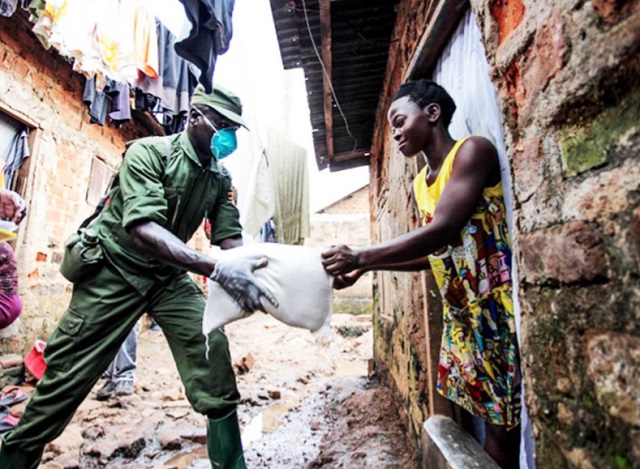
COMMENT | Jonas Mbabazi | Integrity and accountability should be an integral part of a resilient response to the COVID-19 crisis, ensuring that government actions benefit citizens that have been hit hard.
In a rather strange way, many fear that the ongoing pandemic could present opportunities through which government bureaucrats can enrich themselves through fraud and corruption, particularly in relief procurement processes supposed to rescue the vulnerable. This could significantly water down the gains achieved in containing COVID-19.
Both short-and long-term measures are needed to address the existing risks.
Past crises have shown that emergencies and subsequent rapid responses abet corrupt and fraudulent tendencies. So, this is not alien to our governance processes and evidence lack of integrity and accountability could exacerbate the already fragile situation, if not addressed immediately.
Five major risk areas
There is need to critically watch and plug the gaps along FIVE major risk areas, during the emergency response interventions by central and the local governments,
First, is the procurement of supplies both at national and local levels. Procurement presents an avenue for collusion, kickbacks, multiple submissions of same invoices and conflicts of interest in the entire process. For instance, the procurement of food supplies by the Office of the Prime Minister has been marred allegations of fraudulent procurement of relief food supplies and inflation of prices for food supplies to be distributed to the vulnerable as part of the COVID-19 response. There has been an avalanche of complaints of contaminated and substandard foods from the beneficiaries. This was followed by investigations by State House Anti-Corruption Unit into the controversy that OPM procurement processes were bedeviled with underhand dealings.
The second risk area, is the transportation of the supplies to the intended beneficiaries where there is a potential for diversion during transport or storage; unauthorized private use of vehicles; siphoning of fuel; collusion with fuel service providers, and falsified records among others. In an attempt to control and contain the scale of spread of the virus, the movement of both private and government vehicles was suspended. Reports of mismanagement of the movement permits within the ministry of works and transports are common.
The third risk area, is the distribution to ghosts or non-beneficiaries.
There is a risk of distribution of supplies where distributors inflate ration amounts or composition, or knowingly distribute commodities to ‘ghosts’ or non-beneficiaries. Already, there are widespread allegations that a section of individuals has accessed food that was meant to the vulnerable urban poor. Images and stories of privileged Ugandans benefiting from government relief food have been dripping on social media feeds. There have also been media reports of the supplies not being distributed across many areas in the city.
The fourth risk area, is warehousing and storage where those responsible can falsify warehouse documents and divert supplies during storage.
This has been a common practice in the storage of supplies for emergencies. Past experiences have shown those charged with the responsibility of safeguarding government supplies, have used their position and power to self-aggrandize. Already there is a case being investigated, of an official from Office of the Prime Minister who had supplies from WFP meant for refugees at his home. This should be an eye opener.
The fifth risk area is the National and District Taskforces that are mandated to manage resources for COVID-19 response and collect donations from the public.
It should be noted that the task forces have received resources from the central government, individuals, private sector, NGOs, local leaders and other people of goodwill. There are risks mainly about targeting and registration. There is a possibility of the politicization of food assistance, with political leaders, local elites and local relief committees influencing who receives assistance. There is a risk of diversion of assistance to their established patronage networks of political hangers-on and relatives.
Systems key to checking abuse
To address these challenges, the government needs to invest considerably in strengthening systems of finance, logistics, procurement and human resources, and measures to improve accountability to the recipients of relief assistance as well as to those providing funding.
Also, there need for more information of the criteria for selection of beneficiaries, what and how much is expected per recipient and from whom, given that many districts have no such set criteria and use an ad hoc approach to targeting, and as a result, not a needs-based. This will close many opportunities for diversion.
Increased transparency and communication are equally important. The lack of information and the inconsistency in the distribution of relief items is ultimately borne by the beneficiaries, who have no motivation to raise a red flag if those charged with the responsibility have no incentive to make reforms. This would increase trust and confidence between the government and the public which appears to be at its weakest.
There is need for down-ward accountability for general relief supplies provided by government, private sector, individuals and other non-stake actors. In particular, providing information to beneficiaries regarding ration sizes, delivery schedules, as well as the right to complain, where to complain, and issues of confidentiality were considered key to effective accountability structures. Part of a strong accountability mechanism is being clear with beneficiaries regarding any challenges facing the programs, the overall goals and end dates.
There is need to invest in disaster management coordination structures both at the national and local levels and share information regarding the nature and scope of interventions, including total funds planned or programmed and disbursed, disaggregated by sector and by geographic area.
Further, the government needs to strengthen preparedness for scaling-up interventions, such as pre-qualifying vendors, pre-supply contracting arrangements, establish rosters of pre-checked qualified staff to enroll during an emergency, and carry out vetting ex-post of staff recruited under emergency procedures. It is imperative to enhance institutional linkages of complaint mechanisms from the grassroots level to watchdog institutions at the district, regional and nationally such as the police, inspectorate of government, and State House Anti-Corruption Unit among others.
*****
 The Writer is a Research Fellow and Project Manager at ACODE, jmbabazi@acode-u.org
The Writer is a Research Fellow and Project Manager at ACODE, jmbabazi@acode-u.org
 The Independent Uganda: You get the Truth we Pay the Price
The Independent Uganda: You get the Truth we Pay the Price


